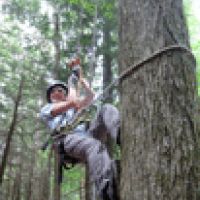Eissenstat et al., 2013
Scaling root processes based on plant functional traits (Invited)
Eissenstat, D.M., McCormack, M.L., Gaines, K., Adams, T. (2013)
Abstract H14D-01 presented at 2013 Fall Meeting, AGU, San Francisco, CA, 9-13 Dec.
-
Shale Hills, INVESTIGATOR
-
Shale Hills, GRAD STUDENT
Abstract
There are great challenges to scaling root processes as variation across species and variation of a particular species over different spatial and temporal scales is poorly understood. We have examined tree species variation using multispecies plantings, often referred to by ecologists as “common gardens”. Choosing species with wide variation in growth rate, root morphology (diameter, branching intensity) and root chemistry (root N and Ca concentration), we found that variation in root lifespan was well correlated with plant functional traits across 12 species. There was also evidence that localized liquid N addition could increase root lifespan and localized water addition diminished root lifespan over untreated controls, with effects strongest in the species of finest root diameter. In an adjacent forest, we have also seen tree species variation in apparent depth of rooting using water isotopes. In particular species of wood anatomy that was ring porous (e.g. oaks) typically had the deepest rooting depth, whereas those that had either diffuse-porous sapwood (maples) or tracheid sapwood (pines) were shallower rooted. These differences in rooting depth were related to sap flux of trees during and immediately after periods of drought. The extent that the patterns observed in central Pennsylvania are modulated by environment or indicative of other plant species will be discussed.
URL : http://ecosystems.psu.edu/research/labs/root-ecology
Citation
Eissenstat, D.M., McCormack, M.L., Gaines, K., Adams, T. (2013): Scaling root processes based on plant functional traits (Invited). Abstract H14D-01 presented at 2013 Fall Meeting, AGU, San Francisco, CA, 9-13 Dec..
 This Paper/Book acknowledges NSF CZO grant support.
This Paper/Book acknowledges NSF CZO grant support.
Explore Further


